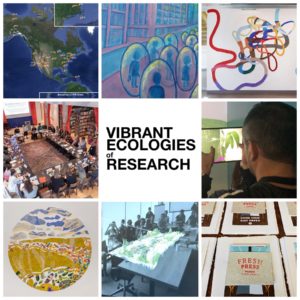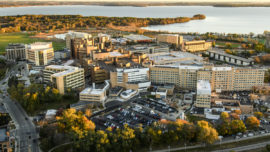Ground Works
Our Mission
 Ground Works promotes research-based, interdisciplinary collaborations through the rigorously peer-reviewed presentation of arts-inclusive work and guided reflection on the processes that support it. The goal of Ground Works is to cultivate a robust, critical community of practice in support of such work, while documenting and sharing effective practices for interdisciplinary collaboration.
Ground Works promotes research-based, interdisciplinary collaborations through the rigorously peer-reviewed presentation of arts-inclusive work and guided reflection on the processes that support it. The goal of Ground Works is to cultivate a robust, critical community of practice in support of such work, while documenting and sharing effective practices for interdisciplinary collaboration.
A Peer-Reviewed Platform
From a2ru’s inception, its partner organizations have asked for one place to find outstanding examples of work that integrates research and practice in the fine, performing, and applied arts and design with other disciplines. Ground Works not only provides a gallery of such work; it advances interdisciplinary research with the arts by requiring rigorous peer review for inclusion on the platform.
Ground Works peer review is critical because while researchers, scholars, and practitioners engage in arts-inclusive collaborations from both within and beyond the academy, many depend on academic review for the establishment of rigor and impact. However, arts-integrative research and creative work pose a challenge to traditional peer review methods because of their multiple disciplinary perspectives. While standards for peer review in disciplinary publication are clearly established (although hotly debated), criteria for high-quality peer review of arts-integrative work have not been well articulated. The Ground Works staff recognizes the emergent nature of these standards and takes responsibility for their integrity through a collaborative editorial process.
Content: What do we promote?
Ground Works showcases projects that demonstrate:
- Arts-inclusive focus
- Interdisciplinarity
- Maturity, with external recognition
- A research component
- Innovative process or outcomes
- Contribution to the fields represented, or to the conversation among those fields
- Understanding of context and precedent
- Accessibility to a broad audience
Ground Works welcomes traditional forms – performances, exhibitions, compositions, publications, or designed and built projects – that also contribute to fields for which such forms are not typical, as well as contributions that demonstrate experimental, non-traditional, or atypical approaches.
Process
Submissions have the following workflow:
- Suitability Review (21-day turnaround) – New submissions are reviewed by Editors to ensure a fit with the scope of the journal and with our goal of showcasing compelling interdisciplinary explorations. Submissions to this stage constitute a “letter of interest” with only a short project summary required. Our aim is that this review stage can be completed quickly.
- Project Review (1–3-month turnaround) – Projects that progress to the second stage are asked to provide a 1,000-word narrative and rich media to accompany their submission. A team of peer Reviewers then evaluate the project and provide feedback. Successful projects are included in our online compendium of projects and invited to contribute reflections on effective practice in their process.
Supporting a Community of Practice
Ground Works is committed to fostering connections among those researchers working across the arts and other disciplines and to mentoring promising projects to publication. Here are some of the ways we do this:
- Reviewers participate in a social and collaborative review of submissions. Through these editorial conversations, reviewers connect to other researchers in their own and in adjacent fields, engaging in lively discussion about new work and its relationship to the field.
- Ground Works sponsors public conversations about the work of arts-integrative research. These may be live or virtual, with a range of topics, venues, and scales. You can see a video from our first such event, Dear Arts Integration Community. Kevin Hamilton moderated this conversation, which included the CERN-IARI team (a physicist, curator, video artist, and mathematician working at the University of Kansas Integrated Arts Initiative), Mary Beth Leigh, Edgar Cardenas, and the public.
- Ground Works authors are encouraged to reflect on their working processes and share those reflections on the site. Author Benjamin David Robert Bogart offers one such reflection on his Ground Works entry “Machines that Dream.”
- Reviewers practice a mentoring style of review, treating submissions as though they were the work of a colleague whose work they want to help succeed. Some reviewers offer to continue working with submitters beyond their initial feedback on the project
Ground Works is committed to open access publication, and your donations help make that access possible.
Project Spotlight: Reco(r)ding CripTech on Ground Works
Reco(r)ding CripTech is a project to document the creative, interdisciplinary processes of the six artists in residence with Leonardo CripTech Incubator in 2022. The Reco(r)ding CripTech documentation will live in an open-access archive on Ground Works. We are working with the artists to center their practices, process, and preferred methods of documentation. The archive, to be released in 2023, may include video- or audio-taped interviews and conversations; written, video- or audio-taped journals; images; notes; creative iterations; and more. The archive will meet the highest standards of accessibility. (Note that within disability culture, the term “crip” recognizes disability as a valued cultural and political identity. But “crip” also identifies an active practice whereby disabled makers and artists transform built environments or technologies to be more accessible.)
Image Credit: Ranganathan, G. Unfolding: Sampling – Beyond Observation: Filling the Gaps (01-10) (2011). From Ground Works project “Unfolding the Genome.”
a2ru Ground Works Advisory Board
The Advisory Board makes recommendations on matters that define Ground Works–inclusion, access, audience, editorial approach, and sustainability.
The 2022 Advisory Board includes:
Cheryl Ball
Digital Publishing Consultant
Executive Director, Council of Editors of Learned Journals
Senior Editor & Publisher, Kairos: A Journal of Rhetoric, Technology, and Pedagogy
Stephen David Beck
Associate Vice President for Research & Economic Development
Haymon Professor of Music
Louisiana State University
Julian Chambliss
Department of English
Core Faculty, Consortium for Critical Diversity in Digital Age Research (CEDAR)
Val Berryman Curator of History, MSU Museum
Michigan State University
Shannon Criss
Professor of Architecture
School of Architecture and Design
University of Kansas
Kevin Hamilton
Professor and Dean
College of Fine and Applied Arts
University of Illinois at Urbana-Champaign
Roger F. Malina
Endowed Chair of Art and Technology and Professor of Physics
University of Texas at Dallas
Executive Editor of Leonardo Publications
Founder of Leonardo/ISAST and Leonardo/OLATS
a2ru Ground Works Editorial Board
The Editorial Board is tasked with balancing the rigor of a peer-reviewed journal with a mentoring, pedagogical approach. They review all Stage 1 submissions, in some cases oversee a project’s progress through Stage 2, and forge connections between Ground Works and their respective fields
The 2024 Editorial Board includes:
Anna Abraham
University of Georgia
Alero Akporiaye
Rhode Island School of Design
Audrey G. Bennett
University of Michigan
Justin Boyd
University of Texas at San Antonio
Kristin Caskey
Virginia Commonwealth University
Robin Cass
Rochester Institute of Technology
Zach Duer
Virginia Tech
Julienne A. Greer
University of Texas at Arlington
Alexandra Harbold
University of Utah
Luvada A. Harrison
University of Alabama
Amy Hillis
York University
Satu Hummasti
University of Utah
Mihyun Kang
Penn State University
Astrid C. Kensinger
Virginia Commonwealth University School of the Arts in Qatar
Julian Kilker
University of Nevada, Las Vegas
Jinku Kim
University of Nebraska-Lincoln
Alexander Lerch
Georgia Institute of Technology
Mary Pat McGuire
University of Illinois at Urbana-Champaign
Lisa DuPree McNair
Virginia Tech
Lisa Mercer
University of Illinois at Urbana-Champaign
Melissa Noble
University of Houston
Maria C. Olivares
Boston University
Cristián Opazo
Pontificia Universidad Católica de Chile
Scott Ordway
Rutgers University
Kirsi Peltomäki
Oregon State University
Nicole Hodges Persley
University of Kansas
Seri Robinson
Oregon State University
Norma Saldivar
University of Nevada, Las Vegas
Lourdes Santamaría-Wheeler
University of Florida
Garrett Schumann
Independent Scholar
Laura Shackelford
Rochester Institute of Technology
Justin P. Sutters
George Mason University
D.J. Trischler
University of Cincinnati
Sanford Tweedie
Rowan University
Jacqueline Wernimont
Dartmouth


